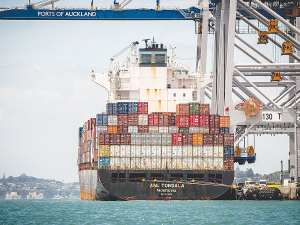Ravensdown partners with Footrot Flats to celebrate Kiwi farming heritage
Ravensdown has announced a collaboration with Kiwi icon, Footrot Flats in an effort to bring humour, heart, and connection to the forefront of the farming sector.
 Shipping disruption caused by Houthi rebels in the Red Sea has so far not impacted fertiliser prices or supply on farm.
Shipping disruption caused by Houthi rebels in the Red Sea has so far not impacted fertiliser prices or supply on farm.
Shipping disruption caused by Houthi rebels in the Red Sea has so far not impacted fertiliser prices or supply on farm.
While both major fertiliser co-operatives, Ballance Agri Nutrients and Ravensdown have enough fertiliser on hand to meet demand, an escalation of the conflict through Middle East may however change things.
The first ship to be sunk by the rebels since the conflict started is the MV Rubymar, which was carrying 21,000 tonnes of ammonium phosphate sulphate fertiliser.
Ballance head of customer Jason Minkhorst told Rural News that while the sinking of MV Rubymar didn’t directly impact its supply chain, it’s indeed a tragic event.
“The only products that Ballance sources to be impacted by these attacks is NPK (nitrogen, phosphorous and potassium), which we source from Europe and can come through the impacted shipping lanes.
“These shipments will take a longer route to avoid the area resulting in a freight increase, but these costs have not been passed on to our customers.”
Minkhorst says the current geopolitical environment and extreme weather events continues to cause instability in fertiliser prices – including the conflict in the Ukraine, tensions in the South China Sea and other parts of the Middle East that are vital to fertiliser production.
“At Ballance, we have a diversified supply chain that allows us to mitigate these disruptions when it occurs. Having local manufacture of nitrogen and phosphate also helps provide supply security.
“Lower incomes, higher interest rates and increased operating costs are driving demand on-farm. However, we are currently seeing fertiliser prices below what they have been at recent peaks, which is good news for farmers,” he says.
Ravensdown, which doesn’t use the Red Sea and Suez Cana route to bring in fertiliser, says the ongoing dispute has impacted vessel rates.
However, so far, there has been little impact on fertiliser supply and availability, according to chief operating officer Mike Whitty.
“The Red Sea situation remains a risk and, like other importers, we are monitoring the situation carefully,” Whitty told Rural News.
He points out that fertiliser prices have largely been unaffected, as the market is influenced by seasonal demand and supply factors.
“From a bulk shipping perspective, we do not use the Suez Canal and Red Sea route.
“However, recent missile attacks combined with the drought in the Panama Canal have contributed to longer shipping routes, decreased capacity and increased demand globally, which means more shipping days are required.
“This has contributed to a firming of vessel rates.”
Whitty warns that any escalation will continue to put pressure on the timing and availability of shipping, with containers particularly likely to be impacted.
Coming in at a year-end total at 3088 units, a rise of around 10% over the 2806 total for 2024, the signs are that the New Zealand farm machinery industry is turning the corner after a difficult couple of years.
New Zealand's animal health industry has a new tool addressing a long-standing sustainability issue.
The Government has announced that ACC will be a sponsor of this year's FMG Young Farmer of the Year competition.
As veterinary student numbers grow to help address New Zealand's national workforce shortge, Massey University's School of Veterinary Science is inviting more veterinary practices to partner in training the next generation of vets.
South Island dairy farmers will soon be able to supply organic milk to Fonterra.
Norwood has announced the opening of a new Tasman dealership at Richmond near Nelson next month.

OPINION: Meanwhile, red blooded Northland politician Matua Shane Jones has provided one of the most telling quotes of the year…
OPINION: This old mutt has been around for a few years now and it seems these ‘once in 100-year’ weather…